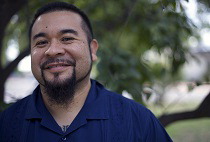| Rudy P. Guevarra Jr., Associate Professor Arizona State University, Asian Pacific American Studies, School of Social Transformation“Aloha Compadre: Latinxs in Hawai’i, 1832-2010” |
| My research over the last eighteen years has focused on comparative and relational histories of Asian Americans, Pacific Islanders and Latinx populations. Receiving a Ford Foundation Senior Fellowship allows me to complete my second single authored book, Aloha Compadre: Latinxs in Hawai’i, 1832-2010. To date no one has fully examined the collective history and contemporary experiences of Latinxs in Hawai’i. I focus on Mexicans, Central Americans and Puerto Ricans, which make up the majority of the Spanish speaking Latinx population in the state. Historically speaking Latinxs have been voyaging to the Hawaiian Islands for over 180 years, yet their presence has been rendered invisible by the tourist industry and the larger local population. Aloha Compadredemonstrates what historian Evelyn Hu DeHart also noted about Asians in Latin America in that, “these histories are hidden in plain view.” The Latinx population has also significantly increased in Hawai’i over the last century. According to the 2010 U.S. Census, Latinxs are now almost ten percent of Hawai’i’s total population and this number is growing. Their rising numbers signal demographic shifts in the state, which in turn are reorganizing current racial, class and labor hierarchies on the islands. Moreover, these shifts are occurring within a context of ongoing settler colonialism, which impact the Native Hawaiian population on the islands.
Aloha Compadre seeks to explore new boundaries of Latinx migration beyond the western hemisphere, as well as the complexities of interracial relationships in Hawai’i, which are transforming the political, social, economic and cultural landscape of the state. Unearthing these histories and contemporary interracial relationships forged from these migrations and identity formations guide the larger goals for this project, which include the following: 1) how race, ethnicity and indigeneity are being rearticulated in diasporic sites such as Hawai’i; 2) conceptually redefining and expanding the borderlands/la frontera to include aquatic regions like Oceania (the Pacific), or as historian Isaiah Helekunihi Walker calls the “boarder-lands.” Simultaneously, I employ Tongan scholar Epeli Hauʻofa’s view of understanding Oceania as “our sea of islands,” which sees the ocean as a borderless, extensive highway system where people converge and connect in the Pacific. I utilize these ideas to reveal how transnational/transpacific migration is also reflective of the historic and contemporary voyages of Latinx migrants to this region and 3) how racial and cultural representations are being challenged by the changing political climate in Hawai’i in the twenty-first century. Exploring these community narratives enables us to understand how the Latinx population navigates the impact of continental U.S. immigration and racial discourses as they seek to build their communities, embrace their multiplicity, and find a sense of belonging in Hawai’i. |

